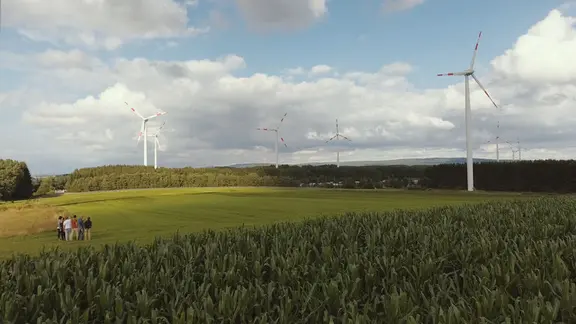
Saturday, 30th August 2024, 09:30 - 12:45 h
This workshop connects climate science with how today’s power systems work - no technical background required. We start with clear evidence for global warming and the greenhouse effect, then build practical literacy around energy: primary → final → useful energy, power vs. energy units, and simple “back-of-the-envelope” checks. Students compare major generation options (steam and gas plants, wind, solar, run-of-river hydro) using plain-English KPIs such as full-load hours, capacity factor, and levelized cost. We discuss system roles (baseload, mid-merit, peakers), how grids stay balanced at 50 Hz, and why storage technologies serve different timescales - from seconds (stability) to seasons (hydrogen/power-to-X). Cost trends for renewables and batteries frame real-world planning choices. A capstone exercise guides students to sketch a simple, evidence-based pathway to a 100% renewable electricity mix for their home country, integrating supply, storage, and demand flexibility.
Videos Prof. te Heesen
TU Delft
TU Delft. EnergyX: Sustainable Energy: Design A Renewable Future. Energy Carriers - Sustainable Energy. https://youtu.be/lrOz4kdsCgo
TU Delft. EnergyX: Sustainable Energy: Design A Renewable Future. Energy Conversion - Sustainable Energy. https://youtu.be/zdG0f7x8yhE
TU Delft. EnergyX: Sustainable Energy: Design A Renewable Future. Overview of electric power systems. https://youtu.be/Ul1ZlxAKsh8
Neso Academy
Neso Academy. Full Course. Power System. https://www.youtube.com/playlist?list=PLBlnK6fEyqRi17rO6B3_XHtMqAKXQ0Tp4
Videos
Prof. te Heesen. Energy Performance Indicators. https://youtu.be/VIG21IJ76dk
Neso Academy
Neso Academy. Full Course. Power System. https://www.youtube.com/playlist?list=PLBlnK6fEyqRi17rO6B3_XHtMqAKXQ0Tp4
Topics
Neso Academy. Introduction to Power System. https://www.youtube.com/watch?v=pWd2b-F4STw
Neso Academy. Load Curve. https://www.youtube.com/watch?v=PxrVMQBEFFQ
Neso Academy. Base Load & Peak Load Plants. https://www.youtube.com/watch?v=t1sNQHqt75M
Neso Academy. Average Load.https://www.youtube.com/watch?v=hmB5lDOXkxc
Neso Academy. Plant Load Factor. https://www.youtube.com/watch?v=p5ZnRxW3mFE
Neso Academy. Plant Capacity Factor. https://www.youtube.com/watch?v=rlCUk7vryC8
Neso Academy. Plant Usage Factor. https://www.youtube.com/watch?v=xFJB-zWUTFI
Neso Academy. Utilization Factor. https://www.youtube.com/watch?v=hGMkuo8HG_Q
Neso Academy. Reserve Capacity. https://www.youtube.com/watch?v=6sqXIAD67aA
Neso Academy. Demand Factor. https://www.youtube.com/watch?v=uyED044gnhI
Neso Academy. Diversity Factor. https://www.youtube.com/watch?v=TD4iZ433LTw
Videos
TU Delft. EnergyX: Sustainable Energy: Design A Renewable Future
The wind resource. https://youtu.be/5peZJxzbMwE
Wind Energy Potential . https://youtu.be/U-50kq7SQVM
Aerodynamic theory. https://youtu.be/BQI7AwKDQXk
Aerodynamic design. https://youtu.be/kmlIb-PFBuw
Wind farm to the grid. https://youtu.be/DgSza4K206E
Global wind energy capacity and statistics. https://youtu.be/7AF0uvCNshg
Future trends in wind energy. https://youtu.be/Sl_FyI6uLzU
DTU Wind Energy
DTU Wind Energy. Coursera online course in wind energy. https://www.youtube.com/playlist?list=PL1lvXOhY32agou48RqUpMTUsobTnDeB58
Books and Online Sources
Quaschning, Volker. Renewable Energy and Climate Change. John Wiley & Sons Ltd Chichester. 2nd edition. 2019
Videos
Prof. te Heesen. Solar Energy
1 The Sun. https://www.youtube.com/playlist?list=PLbOKqNNb8Av_aFfq0-AiLYOOjZ88nhlTP
5 Inverter. https://www.youtube.com/playlist?list=PLbOKqNNb8Av_EZXwMxFsPNEGCKzMA_N8B
6 Interconnection. https://www.youtube.com/playlist?list=PLbOKqNNb8Av_FLqQwZlRcbvX16I-SVfbt
6.1 Interconnection of PV Modules. https://youtu.be/VN6GWt0653A
6.2 Inverter Concepts. https://youtu.be/pKM2yis4b0U
6.3 Interconnection Criteria. https://youtu.be/qpHN9lzwrQ0
7 Shading. https://www.youtube.com/playlist?list=PLbOKqNNb8Av_vvZrNpzFI9iNFu-mNljiq
8 Quality Assurance. https://www.youtube.com/playlist?list=PLbOKqNNb8Av8h7GN5bqaO1Cmc6gVBbN7o
9 Performance Ratio. https://www.youtube.com/playlist?list=PLbOKqNNb8Av-por5QJtUZ9dTfK58BZ_N8
10 Feed-In Management and Energy Exchange Market. https://www.youtube.com/playlist?list=PLbOKqNNb8Av9Jya7u3CdyN9FjYfYyUeNd
11 Self-Consumption. https://www.youtube.com/playlist?list=PLbOKqNNb8Av_J5zaXxv7LvGDklPMxSCdH
TU Delft. EnergyX: Sustainable Energy: Design A Renewable Future
The components of PV systems. https://youtu.be/hXRZzgAGuw4
How does a PV cell work?. https://youtu.be/QAwEtVPkwL0
Existing PV technologies. https://youtu.be/ZH-zwAhUqSg
How does an inverter and MPPT of a PV system Work? https://youtu.be/Zla5vDsiKbo
Central design rules for PV systems. https://youtu.be/fwLRDNCrj28
Status and prospects of PV Technology. https://youtu.be/LHBHhe14Q5k
Economics and Policies for PV systems. https://youtu.be/Y5KbUXTgGbw
Books and Online Sources
PVEducation. A collection of resources for the photovoltaic educator. https://www.pveducation.org/
Quaschning, Volker. Renewable Energy and Climate Change. John Wiley & Sons Ltd Chichester. 2nd edition. 2019
DGS. Planning and Installing Photovoltaic Systems. Routledge. 2013
Konrad Mertens. Photovoltaics - Fundamentals, Technology and Practice. John Wiley & Sons Ltd. (2018). https://www.textbook-photovoltaics.org/
Videos
TU Delft. EnergyX: Sustainable Energy: Design A Renewable Future
Renewable Energy Systems
Potential of Renewable Energy Technologies. https://youtu.be/yC7FZKDL-IE
Hydroelectricty Potential. https://youtu.be/pWI9MdFmrz0
Geothermal Energy Potential. https://youtu.be/mcFX-DHRf5c
Ocean current and Wave Energy Potential . https://youtu.be/NXvLoAYc4gU
Tidal Energy Potential. https://youtu.be/Tg2seIL8otg
Bioenergy Potential. https://youtu.be/GO8pQ6Qk1TA
Energy Use
Energy use in Buildings. https://youtu.be/k43HPpq4ov4
Energy use in Transportation. https://youtu.be/_pcjOCnfEN8
Energy use in Industry. https://youtu.be/08oNj6F4J70
Energy Analysis
1. Our Energy System - Introduction and Overview. https://youtu.be/s-KvZ1EjK2A
2. Our Energy System. https://youtu.be/LhW-OGbuLhs
3. Constructing an energy balance. https://youtu.be/Yi4gasER-D4
4. Reading an energy balance. https://youtu.be/zLEOASP1VVU
5. Factors influencing our energy use. https://youtu.be/Sr8c1GulUB8
6. Trends in Global energy use. https://youtu.be/-lWDWP4-sms
7. Future Energy Demand. https://youtu.be/Z7u4enpjrqI
8. Future Energy Supply. https://youtu.be/RwDJ0F5BZj8
Additional Sources
Prof. te Heesen. Technisches Konzept der Kraft-Wärme-Kopplung. https://youtu.be/684A93fXt-U (in German. Use English Subtitles in YouTube)
FORCE. Power Potential - Tidal Energy in the Bay of Fundy. https://vimeo.com/42384814
Videos
TU Delft. EnergyX: Sustainable Energy: Design A Renewable Future
How does storage work in PV systems? https://youtu.be/4wLmRfNrckw
Khan Academy. Chemistry. Redox reactions and electrochemistry. Galvanic cells
Full Course. https://www.khanacademy.org/science/chemistry/oxidation-reduction#batter-galvanic-voltaic-cell
Redox reaction from dissolving zinc in copper sulfate. https://youtu.be/wVMe8ZmCZo0
Introduction to galvanic/voltaic cells. Introduction to galvanic/voltaic cells
Electrodes and voltage of Galvanic cell. https://youtu.be/m0SFJt_0v28
Shorthand notation for galvanic/voltaic cells. https://youtu.be/xHuLZHasldg
Lead storage battery. https://youtu.be/PQ48N5jaG2w
Nickel-cadmium battery. https://youtu.be/tUvpwdqdLlI
Books and Online Sources
Quaschning, Volker. Renewable Energy and Climate Change. John Wiley & Sons Ltd Chichester. 2nd edition. 2019
Videos
Prof. te Heesen
1. Observations and Measurements. https://youtu.be/hTz25Irmo-8
2. Greenhouse Effect. https://youtu.be/RmvjmT8qsU0
3. Climate Models and Outlook. https://youtu.be/nOjexH7jGVk
Other Sources
IPCC. Climate Change 2013: The Physical Science Basis. https://www.youtube.com/playlist?list=PL8HWK0G9m3B7ae83jZCbxj08quRckQVzi
IPCC. Climate Change 2014. Mitigation of Climate Change. https://www.youtube.com/playlist?list=PL8HWK0G9m3B4zc286ubnMkhDIigVqHGYs
NASA. Climate Change. https://www.youtube.com/user/NASAClimate/playlists
NASA. A Year in the Life of Earth's CO₂. https://youtu.be/x1SgmFa0r04
Brown University. Modeling Our Climate. https://www.youtube.com/watch?v=SuZHnqxltKo
World Climate Research Programme. A Short Introduction to Climate Models - CMIP & CMIP6. https://youtu.be/WdRiYPJLt4o
CarbonBrief. https://www.youtube.com/channel/UCiXgvmQ2jUgUjRpJzvga5Tg
Khan Academy. Introduction to infrared spectroscopy. https://www.khanacademy.org/science/organic-chemistry/spectroscopy-jay/infrared-spectroscopy-theory/v/introduction-to-infrared-spectroscopy
Online Ressources
IPCC. Climate Change Reports. https://www.ipcc.ch/reports/
Our World in Data. CO₂ and Greenhouse Gas Emissions. https://ourworldindata.org/co2-and-other-greenhouse-gas-emissions
NASA. Global Climate Change. https://climate.nasa.gov/
NASA. Earth Observatory. https://earthobservatory.nasa.gov/
NASA. My NASA Data. https://mynasadata.larc.nasa.gov/
NOAA. National Centers for Environmental Information. https://www.ncdc.noaa.gov/
Global Carbon Project. https://www.globalcarbonproject.org/
CarbonBrief. https://www.carbonbrief.org/
Global Carbon Atlas. http://www.globalcarbonatlas.org/
Climate Action Tracker. https://climateactiontracker.org/

Sie verlassen die offizielle Website der Hochschule Trier